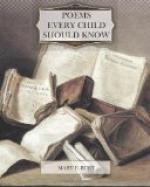The delight with which trees hang out their new little tassels every year is one of the charms of “the pine family.” John Burroughs sent us down a tiny hemlock, that grew in our window-box at school for five years, and every spring it was a new joy on account of the fine, tender tassels. Mrs. Hemans had a vivid imagination backed up by an abundant information.
I come, I come! ye have called me long;
I come o’er the mountains, with light and song.
Ye may trace my step o’er the waking earth
By the winds which tell of the violet’s birth,
By the primrose stars in the shadowy grass,
By the green leaves opening as I pass.
I have breathed on the South,
and the chestnut-flowers
By thousands have burst from
the forest bowers,
And the ancient graves and
the fallen fanes
Are veiled with wreaths on
Italian plains;
But it is not for me, in my
hour of bloom,
To speak of the ruin or the
tomb!
I have looked o’er the
hills of the stormy North,
And the larch has hung all
his tassels forth;
The fisher is out on the sunny
sea,
And the reindeer bounds o’er
the pastures free,
And the pine has a fringe
of softer green,
And the moss looks bright,
where my step has been.
I have sent through the wood-paths
a glowing sigh,
And called out each voice
of the deep blue sky,
From the night-bird’s
lay through the starry time,
In the groves of the soft
Hesperian clime,
To the swan’s wild note
by the Iceland lakes,
When the dark fir-branch into
verdure breaks.
From the streams and founts
I have loosed the chain;
They are sweeping on to the
silvery main,
They are flashing down from
the mountain brows,
They are flinging spray o’er
the forest boughs,
They are bursting fresh from
their sparry caves,
And the earth resounds with
the joy of waves.
FELICIA HEMANS.
THE FORSAKEN MERMAN.
“The Forsaken Merman,” by Matthew Arnold
(1822-88), is a poem that I do not expect children
to appreciate fully, even when they care enough for
it to learn it. It is too long for most children
to commit to memory, and I generally assign one stanza
to one pupil and another to another pupil until it
is divided up among them. The poem is a masterpiece.
Doubtless the poet meant to show that the forsaken
merman had a greater soul to save than the woman
who sought to save her soul by deserting natural
duty. Salvation does not come through the faith
that builds itself at the expense of love.
Come, dear children, let us
away;
Down and away below!
Now my brothers call from
the bay,
Now the great winds shoreward
blow,
Now the salt tides seaward
flow;
Now the wild white horses
play,
Champ and chafe and toss in
the spray.
Children dear, let us away!
This way, this way!




